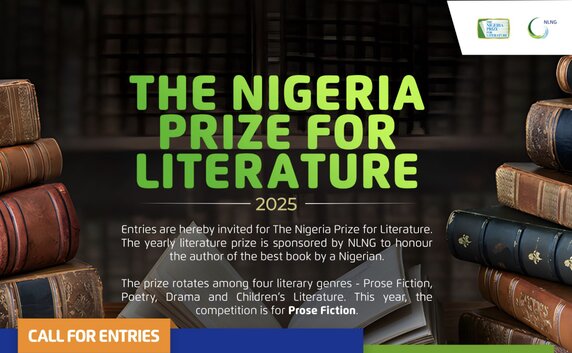The death of literary criticism is the death of literary culture in the most literal sense of that assertion. It means that the structure of checks and balances that scaffolds our literature is being neglected.
By Chimezie Chika
I
In the judgmental corridors of the literary sphere and its many perturbations, the question of whether literary prizes matter is usually asked at strategic intervals, since their advent. Who or what are these prizes for? What do they do in the literary world? What relevance do they hold? Admittedly, many of these questions emanate from responses to being ignored or to the perceived biases in the bestowal of prestige.
Writing in Slate in 2023, Amber Sparks considers a range of reasons—financial security, prestige, getting published, spreading cultural capital, and representation—why prizes matter and concludes that prizes need to do more (especially on the last point): “Why not consider need alongside merit for more major prizes?” Meaning that while prizes play thoroughly important avuncular roles to keep the engine of literature revving in this century, they must bring a fair amount of environmental awareness to these roles.
The increasingly crunchy economic realities of the literary world—where the continuous closure of literary organisations and funding channels has become almost routine—make the work of literary prizes even more important at this time. More than ever before, literary awards, grants, and prizes are the greatest functional route to making literature more visible across the literary world, and even in spheres beyond literature.
The digital revolution that has attended literature in recent times—especially when one considers how integral informal channels such as literary communities on social media, including TikTok, YouTube, and Instagram, have become—makes the reality of the work that literary prizes do, or are supposed to do, even more significant.
If other sections of the literary establishment are being defunded for mostly political reasons in the West especially, as they are at present, then literary prizes in Africa, where some of those economic and social concerns are even more stark, should necessarily take more steps to address “need” in a broad sense.
Rewarding intellect, or aiding the process of manufacturing intellect, which for me is the most pivotal role of literary awards and prizes, should be a matter of, to put it gravely, life and death. There seems to be a consensus to that effect, if one goes through the rules of engagement for which many prizes were established. In general terms, most prizes claim cultural entrenchment (which Sparks partially noted) or commemoration in some form or other as being their main raison d’etre.
Such purposefulness is not new in anything related to literary prizes. In a rambling 1935 essay titled “The Meaning of Literary Prizes”, published in The Atlantic, American essayist Edward Weeks notes that while awards (in cash terms) “is the most satisfying reward an industrial age can bestow”, their major role is to strive to determine literary tastes and attitudes without bias, limitations, or ideological leanings.
For this reason, Weeks is found in that selfsame long-winded essay complaining with near-bitterness about what he sees as the misguided quirks of the Pulitzer Prize in its early years. “[T]he administrators,” he writes whilst quoting Sinclair Lewis, “can, and sometimes do, quite arbitrarily reject the recommendations of their supposed advisers.” Sounds like a valid protestation for the present, if you ask me (the explication of which I will arrive at soon).
On the strength of the foregoing, I want to consider two major points in relation to African literary prizes. a) Are African prizes geared toward both need and merit? b) What is the most befitting literary purchase a prize can have in the digital age?
II
This year, two curious things happened with two African prizes, the Caine Prize and one of the NLNG Nigeria Prizes. Things which, notwithstanding their future repercussions, largely went unacknowledged, like obscure footnotes in an exegetical text. Both cases are similar yet slightly different. In the case of the Caine Prize in 2025, we are faced with the curious case of the “real” Caine Prize, which we have followed for years, not being awarded this year. Instead, the prize board chose to do a silver anniversary award only.

The logic behind such a decision is immediately defeated by the prize’s avowed duty (as stated in their website’s “About” page) “to bring African writing to a wider audience using our annual literary award. In addition to administering the Prize, we work to connect readers with African writers through a series of public events, as well as helping emerging writers in Africa to enter the world of mainstream publishing”.
To reiterate: the Caine Prize simply tells us here that they are in the business of helping mostly emerging African writers and writing find a wider audience by helping to plug them into the right literary channels (an important keyword is “emerging”). If a prize such as this decides in its 25th year to ignore its own self-professed purpose, what can then be said of its relevance at this point in time?
For 24 years the Caine Prize—an award established in memory of Sir Michael Caine, the late Chairman of Booker Plc, the same organisation that funds the Booker Prize—has done a terrific job of discovering new or relatively unknown African writers whose writing has now become known to a wider audience across the world.
Many times, the careers of these writers only really took off after the Caine Prize came to them. Such was the welcome impact the prize has had on a long line of writers since 2000, from Leila Aboulela and Binyavanga Wainaina to Rotimi Babatunde and Okwiri Oduor. Even more remarkable since it is awarded for short fiction.
It is not clear, no matter how one twists the argument on its head, why the Caine Prize chose not to maintain the same pattern of success. Last year, the prize management announced that it plans for a year-long celebration marking its 25th anniversary in 2025; no one expected that the regular prize wouldn’t be any part of those plans.
This is even more telling if we consider that an anniversary award is a good initiative. But anniversary awards have not been widely known to overshadow, or even completely erase, the main award for which an awarding institution is known. The Caine Prize is not the first to give an anniversary award to a past recipient (and they will not be last, nor do I want them to be).

Many major literary prizes routinely give out anniversary, honorary, or lifetime awards on a yearly basis or during bronze, silver, and gold milestone years. But these prizes also make sure to award their main prizes alongside.
The Booker Prize (for which the Caine Prize is doubtless modeled after) has given out anniversary awards on its 25th, 40th, and 50th anniversaries. In 1993, which marked the 25th year since it was established, the Booker Prize ran a special award tagged “Booker of Bookers”, which judged the previous 25 books awarded in the past 25 years of its existence. The award went to Salman Rushdie’s Midnight’s Children. That same year, the regular Booker Prize was awarded to Irish writer, Roddy Doyle’s Paddy Clarke Ha Ha Ha.
To celebrate its 40th anniversary in 2008, the Booker Prize came up with another special prize, tagged “Best of the Booker Award”, and again a special jury awarded the prize to Salman Rushdie’s Midnight’s Children. The same year, the regular Booker Prize went to Indian writer, Aravind Adiga’s stellar novel, The White Tiger.
Ten years later, in 2018, its 50th year, the Booker Prize came up with a special golden anniversary award tagged “the Golden Booker Prize” which was awarded to Michael Ondaatje’s The English Patient. That same year, the regular Booker Prize was awarded to Northern Irish author Anna Burns’ Milkman.
The point of this entire rundown is that anniversary awards have never stopped any literary organisation from continuing their main prize(s); instead, what we got this year is the Caine Prize and its managers cutting out the main prize entirely to award an already established writer. (Instead of cutting, for instance, Booker Prize Foundation is setting the pace even further with the recent announcement of a new £50,000 Booker Prize focused on children’s books, adding to the initiative’s other major awards, The Booker Prize and The Booker International Prize.)
I am sure many people follow the Caine Prize for the novelty of discovery, not to reread old stories. Why can’t both the regular prize and an anniversary prize be awarded at the same time, as others have more thoughtfully done?
It seems to me that the Caine Prize may have deprived an emerging or obscure African writer somewhere of much-needed visibility and the door-opening gestures that come with it. An acknowledgment of “need” on the part of the Caine Prize would have made the necessity for this essay irrelevant. Alas, I do not think any such considerations were made.
A similar move to cut out an important prize was made during the grand award night of NLNG The Nigeria Prizes initiative which, amongst others, awards the prestigious Nigeria Prize for Literature.

During that well-appointed ceremony at Eko Hotel in Lagos, it was announced that 2025 would be the last year in which the Nigeria Prize for Literary Criticism—one of the awards—would be awarded; in its place, a prize for film and creativity was established.
Good initiative though this is, it makes no sense that one would be discontinued in favour of the other. Why can we not have both running at once? I need not begin to enumerate here the merits of literary criticism in the literary ecosystem, the absence of which would’ve (again) made this essay impossible. The role it plays is as indispensable as the human nervous system.
The death of literary criticism is the death of literary culture in the most literal sense of that assertion. It means that the structure of checks and balances that scaffolds our literature is being neglected. Awarding a prize to commemorate the best of literary criticism encourages and entrenches it; not doing that sends the wrong signal, especially in the polyvalent world of digital posse, where literary quality and merit has become blurred with fandom and influencer-ship.
Let us consider also that literary criticism prizes are almost non-existent in Africa (baring organisations like Afrocritik which ran a debut literary criticism contest in 2024).
We can begin to ask ourselves if we are sanctioning the erosion of literary values—which should be interesting to see, since the Nigeria Prize for Literature board is majorly an ivory tower affair—or whether there is an extra-literary interest at play here. I have my problems with how that prize for criticism was managed, but I also simply cannot find any tangible reason as to why anybody thinks it is best to scrap it.
There is so much work to do in Africa as far as literature goes, especially in the light of the present economic and social conditions. Our continent is far behind others in the establishment of robust literary ecosystems, which invariably nurture all liberal humanities, amongst other things. Anybody living in 2025 is acutely aware of these needs, which is why one is driven to wonder if the people managing these institutions are a bit out of touch.
Chimezie Chika is a staff writer at Afrocritik. His short stories and essays have appeared in or forthcoming from, amongst other places, The Weganda Review, The Republic, The Iowa Review, Terrain.org, Isele Magazine, Lolwe, Fahmidan Journal, Efiko Magazine, Dappled Things, and Channel Magazine. He is the fiction editor of Ngiga Review. His interests range from culture, history, to art, literature, and the environment. You can find him on X @chimeziechika1



